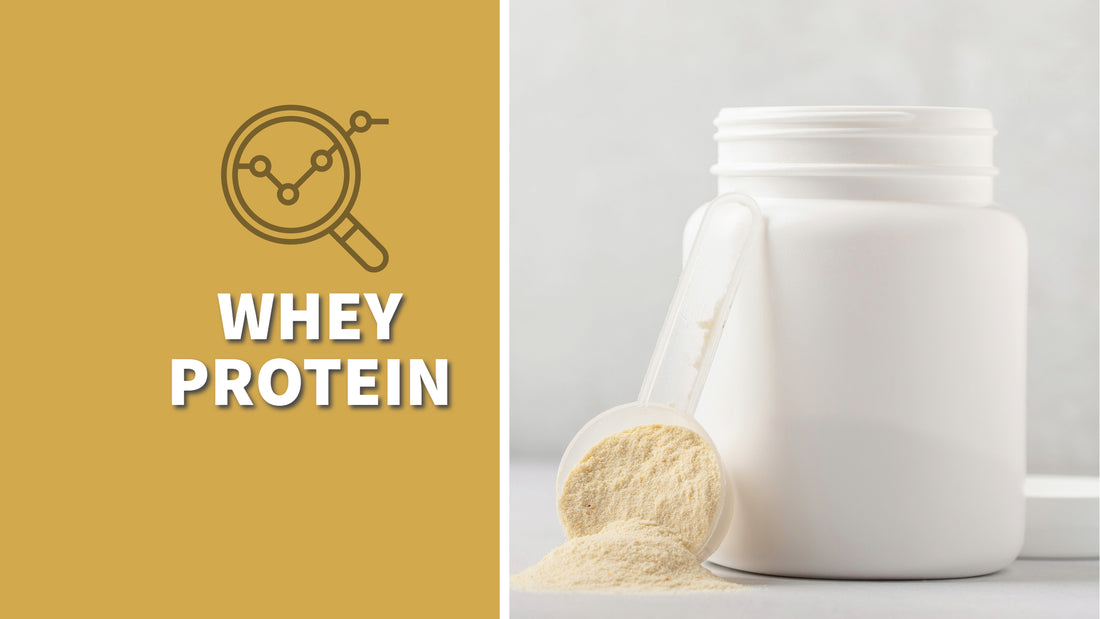
Whey Protein Guide
Whey protein, a high-quality protein naturally found in milk, is a byproduct of the cheese-making process. It is highly regarded for its complete amino acid profile, making it an excellent protein source for various dietary needs. Whey protein is not only a staple in sports nutrition but also a versatile ingredient in many food products.
Production Process:
The process of making whey protein begins with cow's milk, which is comprised of two main types of protein: casein (80%) and whey (20%). During cheese making, enzymes or acids are added to heated milk, causing the casein to coagulate and form curds. The liquid that separates from the curds is whey. This whey is then pasteurized and dried into a powder form for various uses. The drying process involves removing water, lactose, ash, and some minerals, leaving behind a concentrated whey protein.
Applications:
Whey protein is versatile and has a wide range of applications. It's commonly used in the food industry as an additive to enhance texture and nutritional value. It's found in baked goods, salad dressings, ice creams, and soups. In the health and fitness industry, whey protein is a popular supplement for muscle building and recovery. It's also used in infant formula and medical protein supplements due to its high digestibility and well-balanced amino acid profile.
Nutrition:
Whey protein is highly nutritious, containing all nine essential amino acids, making it a complete protein. It's particularly rich in branched-chain amino acids (BCAAs) like leucine, isoleucine, and valine, which are crucial for muscle growth and repair. Whey protein is also low in lactose content, making it more digestible for those with lactose intolerance. It's a good source of calcium and other minerals and is generally low in fat.
Types of Whey Protein:
- Whey Protein Concentrate (WPC): WPC contains varying amounts of fat and carbohydrates (in the form of lactose). The percentage of protein in WPC can range from 30% to 80%, and it tends to have a more robust flavor.
- Whey Protein Isolate (WPI): WPI is more processed than WPC to remove all the fat and lactose. It contains at least 90% protein and is lighter in flavor. It's also lower in lactose, making it a better choice for those with lactose intolerance.
- Whey Protein Hydrolysate (WPH): This form of whey protein has undergone partial hydrolysis, a process necessary for the body to absorb protein. WPH doesn't require as much digestion as the other forms of whey protein, making it easier on the stomach. It's often used in medical protein supplements and infant formulas.
Each type of whey protein offers unique benefits and can be chosen based on individual dietary needs, tolerance, and goals.
Home Use:
In the home setting, whey protein is often used as a dietary supplement with various flavors and blend types. It can be easily incorporated into smoothies, shakes, or even regular meals to increase protein intake. Its versatility also allows it to be used in baking or cooking, adding a protein boost to pancakes, muffins, or homemade protein bars. Unflavored whey protein can also be purchased for more creative use in the kitchen.
Athletic Use:
For athletes and fitness enthusiasts, whey protein is a cornerstone supplement for muscle recovery and growth. Its rich content of branched-chain amino acids (BCAAs) supports muscle repair post-exercise. Athletes who undergo rigorous exercise and fitness routines regularly consume whey protein shakes or bars post-workout to aid in muscle recovery and growth. This extra protein is necessary since their bodies undergo higher wear and tear requiring more protein intake.
Health Benefits
Whey protein offers several potential health benefits:
- Muscle Growth and Repair: Whey protein is rich in branched-chain amino acids (BCAAs), especially leucine, which is known for its role in muscle protein synthesis. Regular consumption of whey protein, combined with resistance training, can lead to increased muscle growth and enhanced repair of muscle tissue post-exercise.
- Weight Management: Whey protein can be an effective tool in weight management strategies. Its high protein content can increase satiety, reducing overall calorie intake. Additionally, protein has a higher thermic effect compared to fats and carbohydrates, meaning it burns more calories during digestion.
- Supports Metabolic Health: Consuming whey protein may improve several markers of metabolic health. This includes lowering blood sugar levels, especially when consumed before or with high-carbohydrate meals, and improving insulin sensitivity.
- Reduction in Blood Pressure: Studies have shown that whey protein can have a beneficial effect on blood pressure, particularly in individuals with elevated levels or hypertension. This is attributed to bioactive peptides in whey called lactokinins, which have ACE-inhibitory properties.
- Anti-Inflammatory Effects: Chronic inflammation can be a precursor to many diseases. Whey protein may exert anti-inflammatory or immunomodulating effects, particularly in cases of acute inflammation.
- Antioxidant Defense: Whey protein contributes to the body's antioxidant defenses by boosting the production of glutathione, a major antioxidant. Glutathione is crucial in reducing oxidative stress and protecting cells from damage.
- Appetite Control: The high protein content in whey can help control appetite by increasing the production of hormones like PYY and GLP-1, which promote satiety, and reducing levels of the hunger hormone ghrelin.
- Supports Cardiovascular Health: By aiding in the reduction of LDL cholesterol and total cholesterol while maintaining HDL (good) cholesterol levels, whey protein can support overall cardiovascular health.
- Enhances Recovery in Athletes: For athletes, whey protein can help reduce muscle damage and improve recovery following intense exercise. This leads to better performance and reduced muscle soreness.
- Beneficial for Certain Medical Conditions: In certain medical conditions like type 2 diabetes and chronic kidney disease, whey protein can play a supportive role by managing protein intake without excessive load on the kidneys and aiding in glycemic control.
- Supports Immune Function: Whey protein contains components like lactoferrin, immunoglobulins, and glycomacropeptides, which can bolster the immune system.
In conclusion, whey protein is a multifaceted supplement that offers a range of health benefits beyond just muscle building. Its role in weight management, metabolic health, anti-inflammatory effects, and overall wellness makes it a valuable addition to a balanced diet. However, it's important to consume whey protein as part of a varied diet and not as the sole source of nutrition.
Whey Protein We Use
Currently we use whey protein isolate which is the purest form of whey protein with lowest amount of lactose and easy on the digestive system. Most food products contain milk powder which contains only 35% protein while whey protein isolate contains 90-95% protein. Whey protein isolate allows our food products to provide the best form of protein available in the market.
FAQ:
Is whey protein safe to consume?
Yes, whey protein is generally safe for most people when consumed in moderate amounts. However, individuals with certain medical conditions or allergies should consult a healthcare provider before use.
What allergens are present in different types of whey protein?
Whey protein contains lactose, although in varying amounts depending on the type. Whey protein isolate has the least lactose and may be suitable for those with mild lactose intolerance.
What is the amino acid profile of whey protein?
Whey protein contains all nine essential amino acids, making it a complete protein. It is particularly high in BCAAs, which are crucial for muscle growth and repair.
Why is whey protein added to food products?
Whey protein is added to food products to enhance their nutritional value, improve texture, and increase protein content.
How is whey protein digested in our body?
Whey protein is easily digested and rapidly absorbed in the body, making it an efficient source of protein.
Does whey protein have a taste or aroma?
Whey protein has a mild, slightly milky taste and aroma, which can vary depending on the type and flavorings added.
Can I bake or cook with whey protein?
Yes, whey protein can be used in baking and cooking. However, high temperatures can denature the protein, so it's best used in recipes that require minimal heating.
How do you store whey protein?
Whey protein should be stored in a cool, dry place. Once opened, it's best to consume it within a few months for optimal quality.
Is whey protein natural?
Yes, whey protein is a natural byproduct of cheese production from cow's milk.
Is whey protein shelf-stable?
Whey protein powder is shelf stable but it's best to store whey protein powder in an airtight, cool and dry space. Once mixed into water to make a whey protein shake, it is best to consume it under 2 hours or kept in the fridge for 48 hours.
What are the signs of quality whey protein?
Quality whey protein should have a high protein content, minimal additives and fillers, be low in sugar and fat, and come from a reputable brand.
Do different types of whey protein cause digestive issues?
Some individuals may experience digestive issues with whey protein, especially those with lactose intolerance or sensitivity to dairy. Whey protein isolate, being lower in lactose, is often better tolerated.
Why is soy lecithin added to whey protein powders?
Natural whey protein powder doesn't mix easily with water. Soy lecithin is an emulsifier that is added in small amounts to help whey protein powder to mix well with water.
How do I make a protein shake from the powder?
Many protein powders have instructions on the back of their label to explain how to make a protein shake. As a rule of thumb, a scoop(40-60g) is mixed with 8-12 oz of cold water inside a blender or shaker bottle to create the protein shake.
Should I consume whey protein before or after a workout?
Whey protein is effective as both before or after a resistance training workout. For long endurance events and training, taking whey protein 30-45 minutes before may be a good idea. We recommend taking our Energy Pods and CocoZen, both containing whey protein, before and endurance event alongside a nutritious of carbohydrate.
